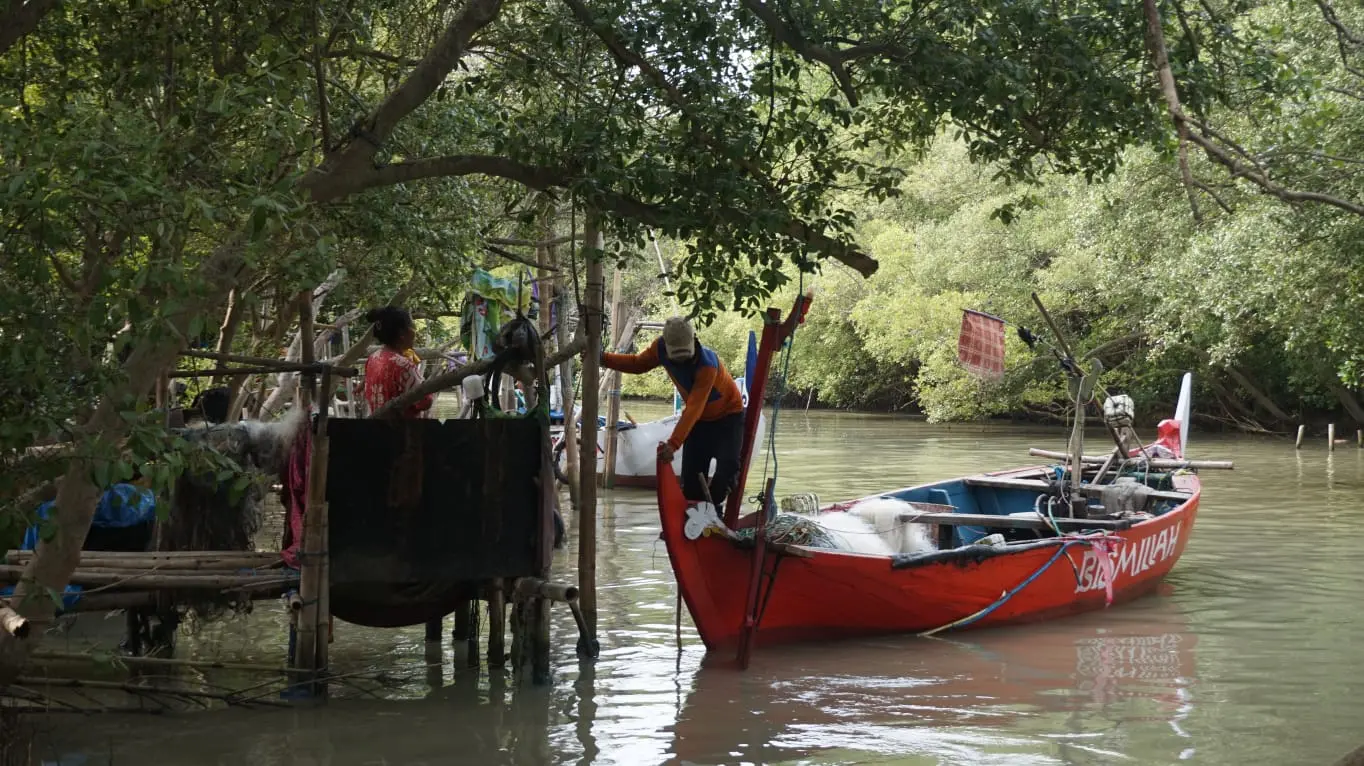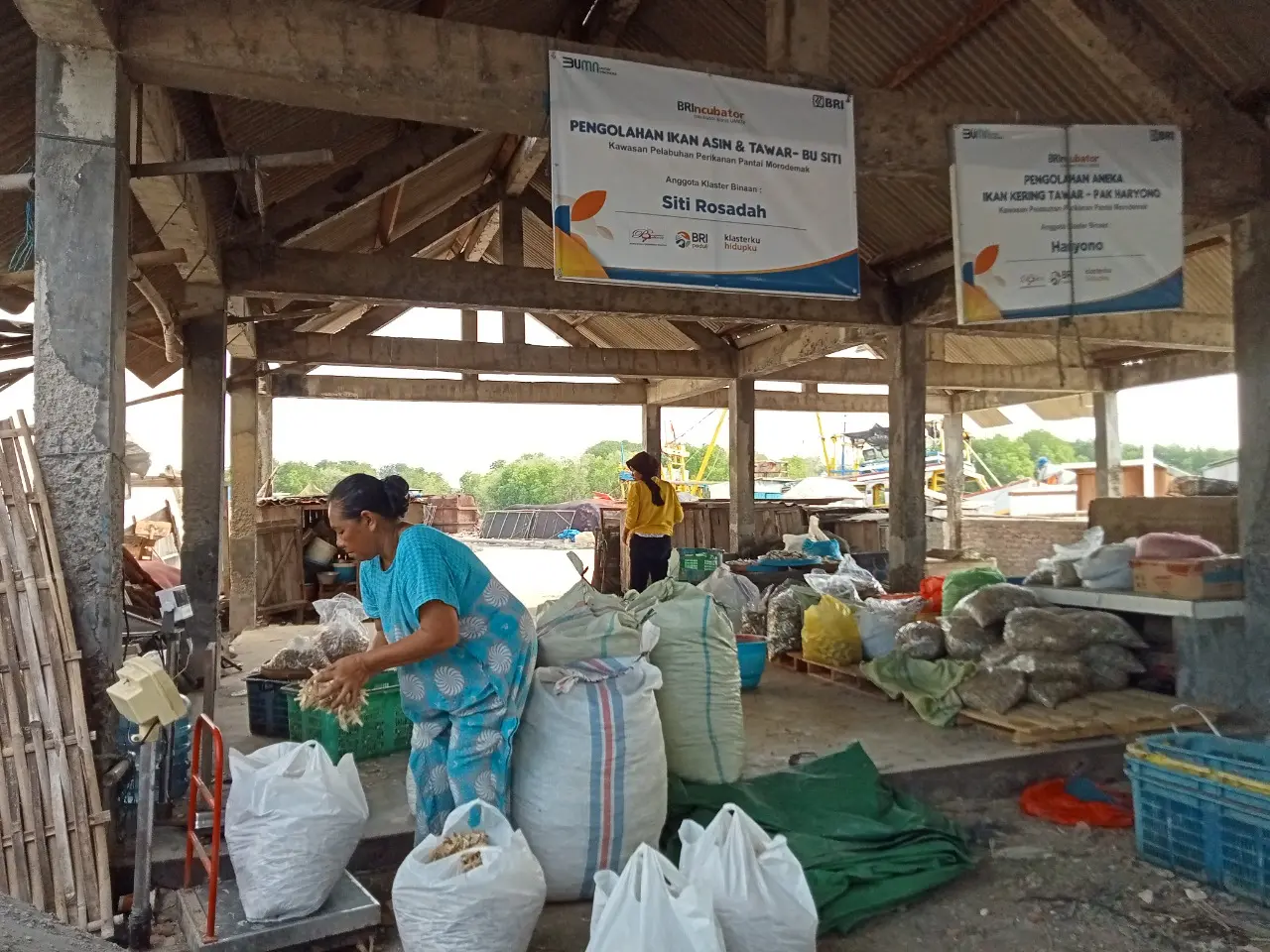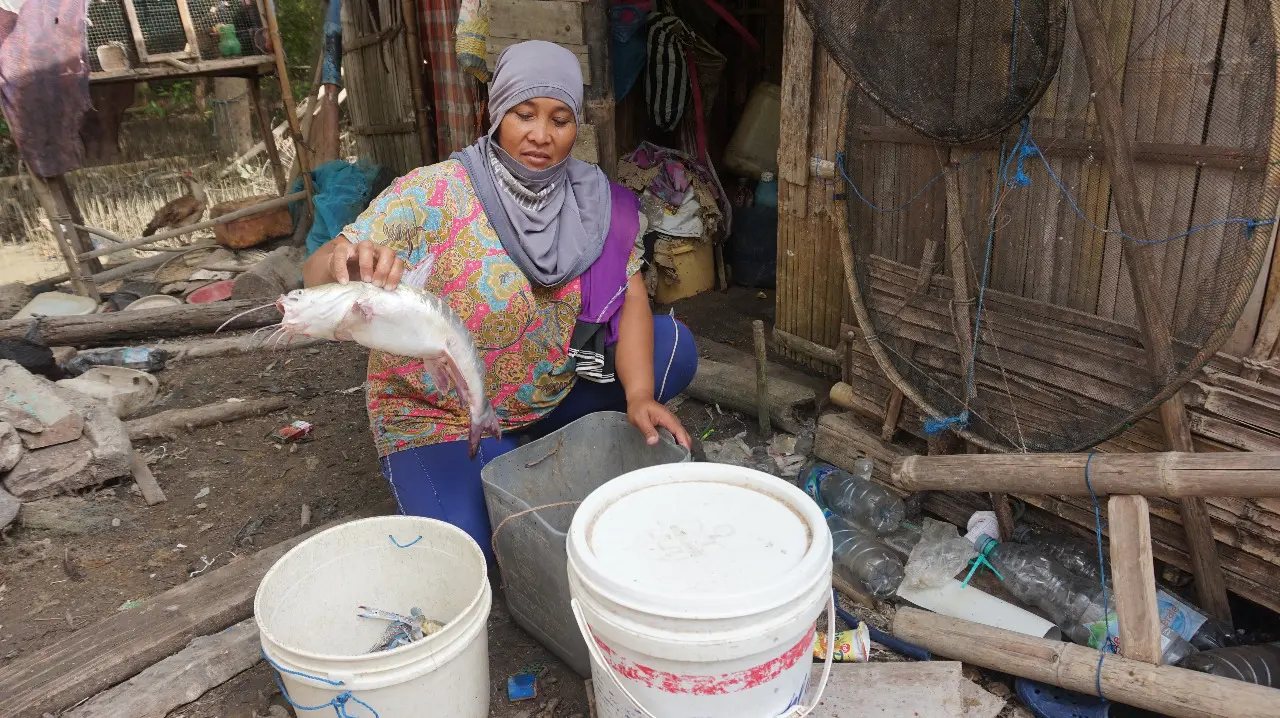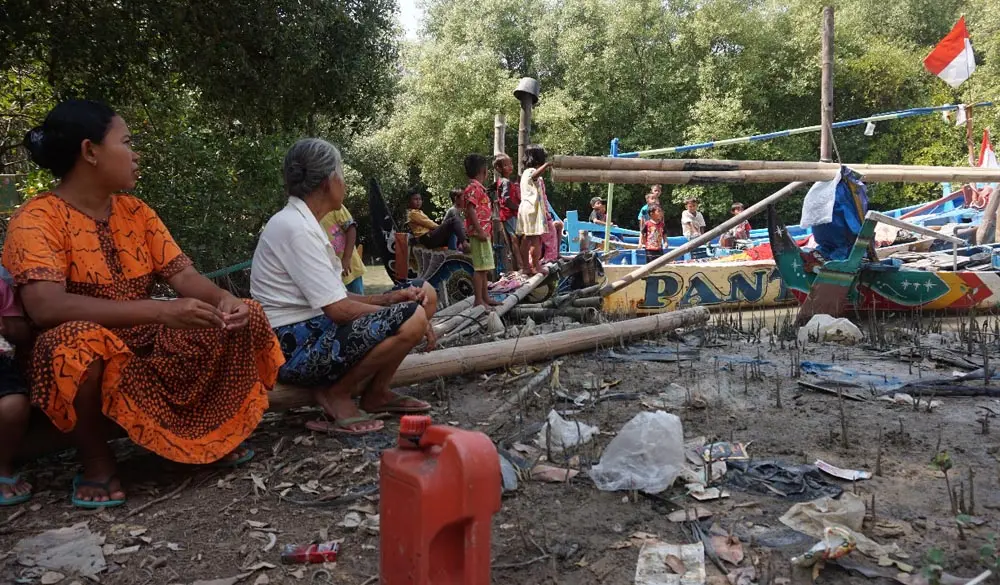Data shows women fishers contribute at least 48 percent to a fisherman’s family income. They seek equal rights in protection and access to managing marine resources.
Under the scorching sun, several women were working at the salted fish and various dried fish center in Kongsi, Purworejo Village in Demak District, Central Java, in mid December 2021. Outside, under a plastic tarp by the river, Umi Kulsum (45) and Saurip (48) were working on sorting out Java barb and small tuna.
Both were nimble in sorting out fish according to the types and sizes. After the fish are sorted out, they are cleaned and then dried under the sun. Kulsum and Saurip sorted fish from 8am to 5pm. A full day’s work will allow them to take home between Rp60.000-Rp70.000 ($4-$5) each.

As a nonprofit journalism organization, we depend on your support to fund more than 170 reporting projects every year on critical global and local issues. Donate any amount today to become a Pulitzer Center Champion and receive exclusive benefits!
Kulsum’s and Surip’s husbands are fishermen. And they work at the fish center to earn extra income for their family. “Thank god, we earn extra to buy our daily needs,” says Umi, a villager from Purowrejo.
“Especially when there’s not many catch from the sea, the income from this work really helps,” Saurip, a villager from Morodemak, added.
Meanwhile, at her house in the fisherman’s village in Morodemak across the river from Purworejo, Mujarokah (52) was packing some dried Java barb into a plastic bag. The dried fish is an order made by her neighbor who wished to take the fish as souvenir for their relatives.
Mujarokah processes her unsold catch into salted fish, or gereh, as the locals call it. She sells the salted fish for IDR 70,000 per kilogram. “I save what I earned just in case we can’t go to sea during the high waves,” said Mujarokah.
Most of the residents of Morodemak and Purworejo depend on marine and coastal resources for their livelihood. The majority of them work as fishers. According to data released by the Demak Statistics Agency in 2020, there are 9,190 fishermen (ship crew) or pendega and 3,739 ship owners. Most of them are from the Bonang District, with a total of 5,794 pandega and 1,807 ship owners. The rest are scattered in Karangtengah, Sayung and Wedung Districts.

Besides Mujarokah, there are 31 fisherwomen in Morodemak and Purworejo who fish with their husband to make ends meet. Kustiah (45), a resident of Tambakpolo, Purworejo Village, has been fishing with her husband for 13 years. Meanwhile, Mufadhilah (49) from Tambakpolo has been fishing 20 years.
Mufadhilah decided to join her husband to go fishing to cover the needs of her family. “I have five children. We have many needs, for school and the needs of daily life. If my husband goes to sea with the jurag (the crew), the income from the sale of fish must be divided. It’s not enough to meet daily needs. We want to try opening a business on land, but there’s no opportunity,” she explained while talking on the veranda of her house, in November last year.
A similar story from Siti Darwati (36), another resident of Tambakpolo. “If I don’t go to sea with my husband, I can’t meet my daily needs, I can’t send my children to school,” she said.
Fisheries activities undertaken by these fisherwomen contribute to fish production in Demak district every year. The Demak Statistics Agency data on Production and Production Value of Capture Fisheries shows that fishery production in Demak in 2019 reached 2,984 tons or IDR 99.553 billion. 2020 stood at 1,520.135 tons or IDR 43.854 billion.
According to the Central Java Marine and Fisheries office, fishery production in 2020 dropped significantly due to the COVID-19 pandemic. Many fishers reduced their fishing trips or even stopped fishing. In fact, there was also a drop in demand soon after the pandemic was announced.
The income of a fisher’s family is very dependent on the seasons. During the high tides, Kulsum’s and Saurip’s husbands cannot go to sea. Fisherwomen cannot go to sea either. They would have no income.
Research conducted by the People’s Coalition for Fisheries Justice (Koalisi Rakyat untuk Keadilan Perikanan, KIARA) and the Legal Aid Institute (Lembaga Bantuan Hukum, LBH) of Semarang in Demak said that in the past, there were two seasons in a year during which they could rely on an abundant catch. Fish season I is in April, May and June, while fish season II is from September to December. From January to March, and July and August, are the quiet months.
However, due to climate change, they can no longer predict the seasons. Extreme, unpredictable weather make it difficult for fishers to have a steady income.
In their ‘Gender Justice in Climate Justice’ book (2011), the Civil Society Forum for Climate Justice (CSF) explains that before the 90s, fishermen could go to sea for a total of 240 to 300 days a year. After that, fishermen could only go to sea for a total of 160 to 180 days a year. As a result, the income of traditional fishermen was significantly reduced by between 50-70%.
But for coastal women, climate change causes the increase of women’s workload, due to the decrease in fish catch which leads to reduction of income, or even no income at all. Under this condition, women become the economic backbone of the family.
Apart from being responsible for domestic affairs, they are also responsible for the household economy. Fisherwomen and fishermen’s wives must find alternative sources of income to ensure their family’s necessities are met.
Secretary General of KIARA, Susan Herawati, said that in the past, when the fishing season was unfavorable, women on the coast of Demak had to seek loans to provide for their family. “During the high tide, fishermen cannot go to sea. Usually, women have to look for loans,” she explained last weekend.
It doesn’t stop there. Some had to pawn their belongings, including precious hand-woven cloths known as jarik, kebaya (traditional wear), gold, and electronic goods. They even sell plates, glasses, and clothing.
Economic activities
Since 2009, following uncertain weather conditions due to climate change, women on the coast of Demak have taken initiatives to improve their family economy. They produce salted fish and other marine catch byproducts such as fish crackers, chips, jerky, shredded fish, and shrimp paste.
Others become workers at salted fish centers, including Umi and Saurip. Umi said that her husband’s income from selling fish was an average of IDR 500,000. After deducting the cost of fuel and the engine rental, he was left with IDR 200,000. “When he goes out to fish with someone else, the income must be divided in half,” said Umi.
This amount doesn’t leave room for anything else except their daily needs. So, Umi wasn’t able to save. The economic activities Umi and other women have undertaken were monumental in the survival of the fishermen’s family during unfavorable fish seasons. “Since I have worked in fish processing, I have been able to help the family’s economy, especially during the unfavorable season for fish,” Saurip continued.
Separately, Mujarokah said that although not in large quantities, her salted fish production has greatly contributed to the survival of her household economy during times when her husband is not able to go fishing.

Important role of women fishers
Susan said that the role of fisherwomen is significant in the livelihood of fishers’ family. KIARA’s Data and Information Center in November 2015 recorded that fisherwomen have contributed at least 48% to their family’s income.
Fisherwomen also play an important role in the fishery production chain. KIARA’s data in May 2014 shows at least 56 million people are involved in fishing activities in the country, with fisherwomen making up 70% or around 39 million of them. These activities range from fishing to processing and marketing fishery products.
“Fisherwomen have a big share in the fisheries economic value chain from pre-production, production to post-production with working hours exceeding 17 hours to 18 hours per day,” Susan explained.
In the pre-production stage, fisherwomen play a role in preparing fishing supplies. In the production stage, women go to the sea with their husbands to fish. Fisherwomen also process fish and other marine catches (processing). Others play a role in sorting, cleaning, and selling fish (marketing).
Various economic roles and initiatives driven by fisherwomen and fishermen’s wives have contributed to the local economy and reduced poverty. Data from the Central Java Statistics Agency (BPS) shows in 2006, of the total 287,082 families in Demak, approximately 150,442 of them were underprivileged. In 2019, the statistics agency recorded 85,419 underprivileged families out of a total of 336,243.
An underprivileged family (keluarga pra-sejahtera, KPS) is a family that does not meet one of the six indicators of the Prosperous Family I or the basic needs indicator. These include family members eating two or more meals a day, and the house they live in has a good roof, floor, and walls, and all children aged 7-15 years in the family attend school.

The founder of the Puspita Bahari Fisherwomen Community, Masnuah said that in the past, most women living the coast of Demak were just waiting for their husband’s catch. However, uncertainty in catches made it difficult for these women to save, resulting in many children dropping out of school.
In 2009, Masnuah initiated an economic empowerment movement and alternative economic activities to encourage the independence of fisherwomen and fishermen’s wives. They were trained to process cheap fish into fish crackers, fish chips, shredded meat, fish jerky, and shrimp paste.
Susan added, the poverty inherent in the coastal communities of Demak at that time (before women’s economic empowerment) was caused by low access of vulnerable groups, particularly fisheries workers and women fishers to resources. Susan underlined the socio-cultural and political system that does not support the liberation from poverty, but in turn causes poverty.
Even though they contribute greatly to the fishery production chain and economic development, the empowerment and protection of fisherwomen are still far from being expected. According to Susan, Law Number 7 of 2016 concerning the Protection and Empowerment of Fishermen, Fish Cultivators, and Salt Farmers has not been fully implemented.

A number of 31 fisherwomen in the Demak Regency have indeed received recognition as fisherwomen. However, according to her, recognizing the identity of women involved in the fishery production chain is not enough. The state must also ensure that fisherwomen and fishermen have the same rights in obtaining protection and have equal access to managing the sea.
She gave an example. When there is aid of boats, fisherwomen do not usually get a share. So far, those who have received the aid of boats have been fishermen. The same goes for empowerment. The aid given to fisherwomen is an aid for fish processing. In fact, they need fishing gear or nets.
“The government has domesticated the role of women whose business is only in the kitchen. In fact, women are also involved in fishery production. Aid should pay attention to equality,” she stressed.
Regarding this matter, Mufadhilah said that during the 20 years she had been at sea, she had only received the aid of a net once. Meanwhile, her husband has received aid several times, such as fish boxes, nets, and diesel fuel.
Susan further noted that the state must ensure it has a data of how many women are involved in the fisheries production chain for the protection and empowerment of fisherwomen. “If the state does not have a concrete database, how will the state think about the budget for the protection and empowerment of fisherwomen?” she continued.
Susan hopes the coverage of the protection plan will be expanded to include not only women fishers but also women who are involved in the post-production and marketing activities, spread across 10,666 coastal villages in Indonesia.
Mohamad Fathurakhman, head of the Demak District Maritima and Fisheries office, said that his department is providing training on fisheries product processing as part of its economic empowerment program for fishermen’s family. “We provide guidance starting from the upstream to downstream sector, including training, equipment, and marketing,” Fathurakhman said.
There are currently 33 types of fisheries products produced by the sector in Demak including slow-cooked milk fish (bandeng presto), fish cakes, crackers, and fish nuggets.
However, Fathurakhman said, there isn’t yet a program designed specifically for fisherwomen due to lack of concrete data.
“For women fishers, the data is still not clear as they generally are helping their husband fishing. There is no data of boat ownership, under their name. Moving forward, we will initiate data collection. And if possible, we will form groups,” Fathurakhman said.






